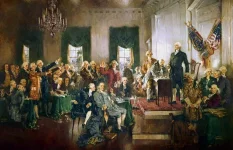Re: 14th Amendment - Original Intent and Roe V Wade
I read the amendments to ensure I recalled them correctly. If your argument is that the issue has been argued and ruled, then what's the point of this forum? Surely, that's not what you meant. Right?
That's like saying no one can disagree with the Supreme Court, ever.
Er, that's pretty broad. Most of the RvW opinion was based on the 14th. If you cant even grasp the arguments, I'm pretty sure my explaining them wont help. But there are at least 10 precedents that support the opinion. One of my co-posters has that list, but I do not.
Minnie, do you happen to have your list handy?
Links in posts 189 and 190 support the 13th and 4th, but I havent done so for the 14th.
There were several right to privacy precedents set before Roe v Wade.
The more precedents, the harder it is to overturn a SC ruling.
It will be extremely hard to overturn Roe without also striking down the precedents of right to privacy cases before Roe including right to privacy regarding child rearing rights , such as the right for parents to send their children to private or religious schools instead of public schools.
These most likely would become dismantled if Roe v Wade were overturned.
Weems v. United States (1910)
In a case from the Philippines, the Supreme Court finds that the definition of "cruel and unusual punishment" is not limited to what the authors of the Constitution understood under that concept.
Meyer v. Nebraska (1923)
A case ruling that parents may decide for themselves if and when their children may learn a foreign language, based upon a fundamental liberty interest individuals have in the family unit.
Pierce v. Society of Sisters (1925)
A case deciding that parents may not be forced to send their children to public rather than private schools, based on the idea that, once again, parents have a fundamental liberty in deciding what happens to their children.
Olmstead v. United States (1928)
The court decides that wire tapping is legal, no matter what the reason or motivation, because it is not expressly prohibited in the Constitution. Justice Brandeis' dissent, however, lays the groundwork for future understandings of privacy.
Skinner v. Oklahoma (1942)
An Oklahoma law providing for the sterilization of people found to be "habitual criminals" is struck down, based on idea that all people have a fundamental right to make their own choices about marriage and procreation.
Tileston v. Ullman (1943) & Poe v. Ullman (1961)
The Court refuses to hear a case on Connecticut laws prohibiting the sale of contraceptives because no one can demonstrate they have been harmed. Harlan's dissent in Poe, however, explains why the case should be reviewed and why fundamental privacy interests are at stake.
Griswold v. Connecticut (1965)
Connecticut's laws against distribution of contraceptives and contraceptive information to married couples are struck down, with the Court relying on earlier precedent involving the rights of people to make decisions about their families and procreation as a legitimate sphere of privacy.
Loving v. Virginia (1967)
Virginia law against interracial marriages is struck down, with the Court once again declaring that marriage is a "fundamental civil right" and that decisions in this arena are not those with which the State can interefere unless they have good cause.
Eisenstadt v. Baird (1972)
The right of people to have and know about contraceptives is expanded to unmarried couples, because the right of people to make such decisions exists due not simply to the nature of the marriage relationship. Instead, it is also due to the fact that it is individuals making these decisions, and as such the government has no business making it for them, regardless of their marital status.
Roe v. Wade (1973)
The landmark decision which established that women have a basic right to have an abortion, this was based in many ways upon the earlier decisions above. Through the above cases, the Supreme Court developed the idea that the Constitution protects a person's to privacy, particularly when it comes to matters involving children and procreation.


